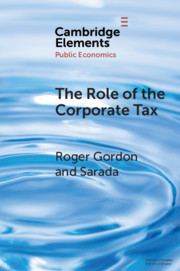Refine search
Actions for selected content:
26 results
Tax evasion in a heterogeneous-agent incomplete-markets economy
-
- Journal:
- Macroeconomic Dynamics / Volume 29 / 2025
- Published online by Cambridge University Press:
- 11 July 2025, e118
-
- Article
- Export citation
40 years of tax evasion games: a meta-analysis
-
- Journal:
- Experimental Economics / Volume 24 / Issue 3 / September 2021
- Published online by Cambridge University Press:
- 14 March 2025, pp. 699-750
-
- Article
- Export citation
Cheating, emotions, and rationality: an experiment on tax evasion
-
- Journal:
- Experimental Economics / Volume 13 / Issue 2 / June 2010
- Published online by Cambridge University Press:
- 14 March 2025, pp. 226-247
-
- Article
- Export citation
1 - Tax Noncompliance at the Top
-
- Book:
- Untaxed
- Published online:
- 22 November 2024
- Print publication:
- 28 November 2024, pp 13-37
-
- Chapter
- Export citation
2 - How the Tax System Addresses Noncompliance
-
- Book:
- Untaxed
- Published online:
- 22 November 2024
- Print publication:
- 28 November 2024, pp 38-63
-
- Chapter
- Export citation
4 - Social Justice through Taxation?
-
-
- Book:
- Social Justice in Twentieth-Century Europe
- Published online:
- 29 February 2024
- Print publication:
- 07 March 2024, pp 78-95
-
- Chapter
- Export citation
36 - Tax Avoidance
- from Part L - Tax Avoidance
-
- Book:
- Foundations of Taxation Law
- Published online:
- 09 February 2024
- Print publication:
- 15 February 2024, pp 922-942
-
- Chapter
- Export citation
6 - Institutional Dimensions of Tax Reforms in Bangladesh
- from Part II - Six Challenging Institutional Areas
-
-
- Book:
- Is the Bangladesh Paradox Sustainable?
- Published online:
- 10 January 2024
- Print publication:
- 18 January 2024, pp 185-217
-
- Chapter
-
- You have access
- Open access
- HTML
- Export citation
Discussion: Institutional Dimensions of Tax Reforms in Bangladesh
- from Part II - Six Challenging Institutional Areas
-
-
- Book:
- Is the Bangladesh Paradox Sustainable?
- Published online:
- 10 January 2024
- Print publication:
- 18 January 2024, pp 218-221
-
- Chapter
-
- You have access
- Open access
- HTML
- Export citation
Governing Global Tax Dodgers: The “Group of Four” and the Taxation of Multinational Corporations, 1970s–1980s
-
- Journal:
- Business History Review / Volume 97 / Issue 3 / Autumn 2023
- Published online by Cambridge University Press:
- 23 November 2023, pp. 547-574
- Print publication:
- Autumn 2023
-
- Article
- Export citation
Formal and informal institutions: understanding the shadow economy in transition countries
-
- Journal:
- Journal of Institutional Economics / Volume 19 / Issue 5 / October 2023
- Published online by Cambridge University Press:
- 11 January 2023, pp. 656-672
-
- Article
-
- You have access
- Open access
- HTML
- Export citation
The Accountant as a Means to Corporate Tax Compliance: Evidence from a Randomized Field Experiment in Ecuador
-
- Journal:
- Latin American Research Review / Volume 58 / Issue 1 / March 2023
- Published online by Cambridge University Press:
- 02 November 2022, pp. 69-89
-
- Article
-
- You have access
- Open access
- HTML
- Export citation
Tax evasion and optimal corporate income tax rates in a growing economy
-
- Journal:
- Macroeconomic Dynamics / Volume 27 / Issue 3 / April 2023
- Published online by Cambridge University Press:
- 26 January 2022, pp. 743-769
-
- Article
-
- You have access
- Open access
- HTML
- Export citation
39 - Tax Avoidance
- from Part N - Tax Avoidance
-
- Book:
- Foundations of Taxation Law 2022
- Published online:
- 01 February 2022
- Print publication:
- 25 January 2022, pp 954-963
-
- Chapter
- Export citation
4 - Public Finances and Private Interests
-
- Book:
- Reason and Experience in Renaissance Italy
- Published online:
- 18 November 2021
- Print publication:
- 25 November 2021, pp 103-144
-
- Chapter
- Export citation
3 - Resisting Agricultural Taxes
- from Part I - Everyday Politics of Peasants
-
- Book:
- The Power of the People
- Published online:
- 24 December 2021
- Print publication:
- 11 November 2021, pp 63-75
-
- Chapter
- Export citation
Tax compliance and social desirability bias of taxpayers: experimental evidence from Indonesia
-
- Journal:
- Journal of Public Policy / Volume 42 / Issue 1 / March 2022
- Published online by Cambridge University Press:
- 17 May 2021, pp. 92-109
-
- Article
- Export citation
4 - The Russian Government v. Mari Vagliano, 1881–1887
-
- Book:
- Creating Global Shipping
- Published online:
- 19 August 2019
- Print publication:
- 29 August 2019, pp 100-121
-
- Chapter
- Export citation

The Role of the Corporate Tax
-
- Published online:
- 01 August 2019
- Print publication:
- 15 August 2019
-
- Element
- Export citation
Do Most U.S. Farms Really Lose Money? Taxation and Farm Income Underreporting
-
- Journal:
- Journal of Agricultural and Applied Economics / Volume 51 / Issue 4 / November 2019
- Published online by Cambridge University Press:
- 29 July 2019, pp. 646-663
-
- Article
-
- You have access
- Open access
- HTML
- Export citation
